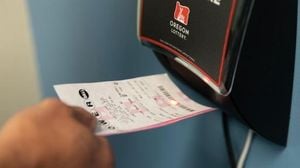With the countdown to the German federal election on February 27, 2025, the political atmosphere is buzzing with both anticipation and tension. Social media platforms are rife with disinformation about candidates and political parties, prompting calls for vigilance from political leaders and fact-checkers alike.
Konstantin von Notz, deputy parliamentary group leader of the Greens, recently highlighted the prevalence of misleading claims circulating online, particularly one involving the Alternative for Germany (AfD) party. He posted on platform X, questioning the authenticity of an offensive AfD election poster featuring symbols reminiscent of Nazi iconography. The poster depicts the illustration of an airplane with lightning symbols near its turbines, which some claimed were reminiscent of the SS insignia used during Nazi Germany. Despite concerns, fact-checkers affirmed the poster's validity, explaining the imagery was part of stock photography from Getty Images, not deliberately incorporated by the AfD.
Similarly, the AfD’s use of AI-generated campaign videos has drawn scrutiny. One such video depicted Health Minister Karl Lauterbach being forcibly removed by police, which Lauterbach condemned, stating, “Such videos, AI fakes, stoke hatred in our society.” He emphasized the dangerous precedent these misrepresentations set for political discourse.
Another issue has been the dissemination of misleading photographs implying threats to kindergarten groups, particularly following a recent violent incident. The AfD Mayen-Koblenz Facebook page shared footage of police accompanying children, misrepresenting it as evidence of increased police protection. The police later clarified via their own X post, explaining the photo was taken during a scheduled school visit to the police station, not indicative of some wider societal alarm.
Adding to the complexity of the electoral discourse, rumors have surfaced concerning President Frank-Walter Steinmeier allegedly saying the election could be annulled should right-wing parties win. These claims have been refuted, as various media entities have verified Steinmeier's actual remarks from his speech on December 27, 2024, which called for fair and transparent elections, devoid of external interference. "The electoral decision is made solely by eligible voters in Germany," Steinmeier asserted during his address.
A different aspect of the voting rights conversation involves the legal circumstances surrounding prisoners. The Justice Ministry of Rhineland-Palatinate has confirmed approximately 1,900 inmates will be eligible to vote. These individuals, assuming they meet the age and nationality requirements, can utilize mail-in ballots for the election. This process highlights the contrasting rules between active and passive voting rights within Germany, particularly how certain convictions can influence one’s ability to hold political office.
According to the Ministry's statistics, as of January 17, 2025, there are nearly 3,000 inmates across various correctional facilities, with strict regulations on how felonies affect voting rights. While active voting rights are often retained, passive rights differ significantly, as individuals sentenced to over one year typically lose their right to be elected to political office for five years.
The conversation surrounding voting rights extends to the ethical obligations of political figures to correct misinformation and clarify the laws governing elections and voting rights. Experts assert the necessity of maintaining integrity within the electoral framework, especially as one approaches the election date.
This brewing situation calls for concerted efforts by authorities and citizenry alike to counter disinformation and uphold the sanctity of democratic processes. The intertwining threads of misinformation and the nuanced regulations governing voting rights create significant obstacles as voters prepare for the upcoming elections.
Germany finds itself at a crossroads as it approaches the 2025 federal election; the impact of calculated disinformation campaigns could play a pivotal role, influencing public perception and voter turnout. With leaders such as Lauterbach and von Notz vocalizing concerns over misleading narratives, the call for transparency and truthfulness has never been more urgent. Social media's role as both the platform for spreading misinformation and as the battleground for political dialogue continues to evolve, forcing stakeholders to rethink their strategies in engaging with the electorate.
177830



